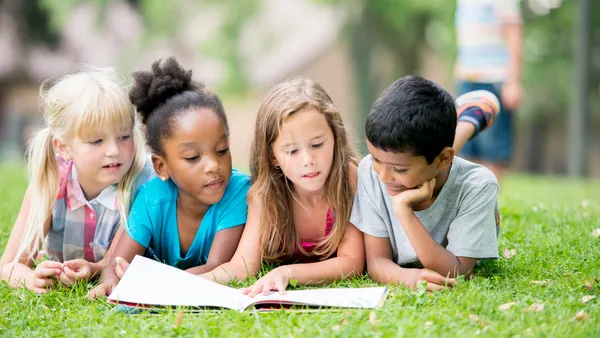Dive Brief:
- Gay-Straight Alliance (GSA) clubs, started at middle schools, can come at a time in a student’s life when they’re beginning to discover more about themselves, including who they’re attracted to and their sexuality, and developing their social-emotional intelligence, middle school English language arts teacher Heather Wolpert-Gawron writes for Edutopia.
- Waiting to launch these clubs at the high school level may be “denying the safe space they would provide and the positive impact they could have, for students prior to 9th grade,” Wolpert-Gawron writes, noting that one out of six LGBTQ students had “seriously considered suicide,” between the 9th and 12th grades, quoting 2016 statistics cited by The Trevor Project.
- GSA clubs also differ from other school extracurricular programs in that they’re run by students, giving them more autonomy over how they’re constructed and a focus on keeping membership private. That way any student can feel safe participating.
Dive Insight:
Curriculum doesn’t have to end at the classroom door. Instead, after-school activities, such as sports teams or clubs, can enhance student learning both in hard academics and soft skills. Social-emotional learning (SEL) in particular can be extended during club time, helping to broaden and extend skills such as empathy and communication.
Even if after-school programs don’t specifically mention SEL skills, they indirectly do foster these outcomes, helping students develop “self-confidence, self-regulation and social competence,” authors Noelle Hurd, assistant psychology professor at the University of Virginia, and Nancy Deutsch, an associate education professor at UVA, wrote in their 2017 article “SEL-Focused After-School Programs,” published by Princeton University.
“After-school programs are uniquely positioned to further the goals of the SEL movement,” they wrote. “Not only are their objectives aligned with those of targeted SEL interventions, they also can help level the playing field for young people with the fewest resources.”
A club’s own mission may even dovetail with SEL skill sets, such as encouraging students to reach out to peers who may be isolated. Researchers examined how schools in CORE (California Office to Reform Education) school districts put SEL practices into play, finding that schools often had “clubs that promoted kindness among students, that specifically encouraged members to reach out to lonely students, or that mediated peer conflict,” wrote authors from a 2018 report for Policy Analysis for California Education.
These after-school programs may extend the school culture, and do so in an environment where students feel more comfortable. “Many schools used elective courses, clubs, and after-school programs to promote student engagement with school, a positive climate, and relationship-building,” noted the CORE report, adding that educators felt that participation on nonacademic areas, such as the arts, "provided important opportunities for school engagement, self-expression and the development of social-emotional skills.”
Just as a Gay-Straight Alliance after-school club can help foster communication and empathy between students, schools can harness other extracurricular programs to put skills into practice that may be introduced in a classroom, and then further put into practice when the books are put away.




 Dive Awards
Dive Awards







